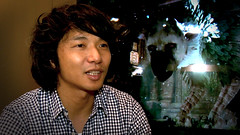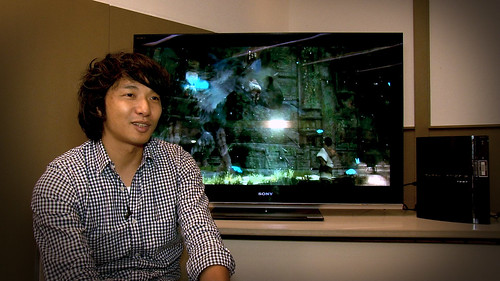Fumito Ueda is a name well known to most PlayStation fans. After directing the iconic PS2 games Ico and Shadow of the Colossus, Ueda-san fast became one of the most celebrated figures in international game development. Now he’s working on a new game, the boy-beast buddy adventure The Last Guardian. If you missed the new trailer released one week ago at the Tokyo Game Show, you can watch it below.
While in Tokyo, I had the pleasure of speaking with Ueda-san about The Last Guardian and his upcoming PS3 compilation Ico and Shadow of the Colossus Collection. I knew that getting a lot of firm details about a game as enigmatic and ambitious as The Last Guardian would be no easy task, so I decided to focus my questions on learning more about how the game plays, its core mechanics, and nuances I spotted in the trailer. Ueda-san’s replies provide a rare glimpse into one of 2011′s most intriguing games.
Sid Shuman: How would you describe The Last Guardian to somebody who had never seen it before?
Fumito Ueda, Director, The Last Guardian: It’s not a pet game, but there is a live animal in the game. I would describe it as an adventure game that you play with this animal.


SS: Will you control the boy, Trico, or both?
FU: You can only control the boy.
SS: What can you tell us about the boy? Does he have a name? Is he on a quest of some sort?
FU: The boy does not have a name…yet. The goal of the boy is to escape from the location you see in the trailer.
SS: Judging by the video, Trico (the beast) appears to be be a powerful force in combat situations. Is there a combat element to The Last Guardian? How does it work?
FU: As you saw in the video, Trico is able to defeat an enemy with one swipe. So in that sense, he functions as a guardian of sorts. But the boy is unable to defeat the enemies on his own — that’s the gameplay element involved.
SS: What can you tell us about the enemies we’ve seen in The Last Guardian? In the trailer, they appear to almost fall apart like statues…
FU: I can’t give you any details about the enemies. But I will say that they are not acting fully out of their own intentions.
SS: Is Trico the only creature of that size in The Last Guardian’s world?
FU: Again, I can’t give you any specific details. But there may be something like that out there…

SS: Shadow of the Colossus was known for its unusual control scheme. Will The Last Guardian follow suit with its controls, or will the controls feel familiar to players?
FU: The actual method of controls and button layouts have not been decided yet, because it doesn’t take much time to change the control scheme. But because we’re using the theme of an animal for The Last Guardian, I also want people who are not serious game players to try out this game. So I want the controls to be simpler than before.
SS: Many game journalists — and even the entry on Wikipedia — have described Shadow of the Colossus as one of the best examples for video games being an art form. How does that make you feel? Do you agree?
FU: I’m happy about it, I’m flattered. But I wonder what part are they are referring to when they make that comment, that it’s art. What part are they looking at? Because I think it’s possible to make it even more artistic. But because it’s a video game, those possibilities have been subdued somewhat — it’s a game. So I’d be interested to know what part, exactly, they mean when they refer to it as art.
There are games out there that are much more artistic than Shadow of the Colossus. And personally I also believe that it would be possible to make it even more “arty,” so to speak.

SS: What other games do you think represent a good argument for games as art?
FU: I guess it depends on how you define art, of course. But in a Japanese conception of the term “art,” it’s thought that it might be something that’s difficult to understand, or complex. Or something unique or uncommon.
So given that definition of art, maybe it’s a little detrimental to actually name any titles.
SS: You were asking why so many people name Shadow of the Colossus as an example of art. I think many people would answer that it’s because players begin to sympathize with the Colossi…
FU: So it makes you think — I understand.



























